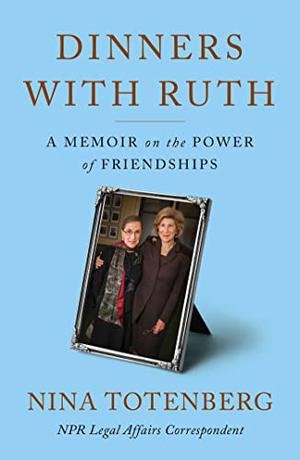Dinners with Ruth: A Memoir on the Power of Friendships
by Nina Totenberg
Nina Totenberg, so familiar to us as NPR’s award-winning, insightful correspondent on legal affairs and the Supreme Court, was known as well to some in our book group as a former close neighbor, growing up in Newton with her father, legendary violinist and teacher Roman Totenberg, her “independent-minded” mother turned realtor Melanie, and her two sisters Amy and Jill, her “best friends.” Ruth Bader Ginsberg grew up in Brooklyn, where, in less well-known aspects to us on her journey to becoming a Supreme Court Justice, she enjoyed being a high-school baton twirler, cello player, and valedictorian, and then went on to study literature under Russian novelist Vladimir Nabokov at Cornell “where she truly came alive.”
Totenberg’s memoir describes how each, coming of age in the pre-feminist era of the 30’s, 40’s, and 50’s, shared similar struggles in the workplace at the time, fighting to pry open career doors a crack at a time, climbing the ladder a rung at a time, and, in the end, helping to transform women’s role in society. Their paths first crossed in 1971 with legal affairs reporter Totenberg’s phone call from a pay telephone booth asking Ginsberg to explain her now famous legal brief before the Supreme Court asking the Court to declare a law that discriminated “on the basis of sex” to be unconstitutional on the basis of the 14th Amendment’s guarantee of “equal protection under the law.”
An almost 50-year special friendship ensued, even to Ginsberg’s last days, with the power of friendship itself becoming the abiding theme of Totenberg’s book. What Totenberg shared with Ginsberg as well as with others in her book, including Linda Wertheim and Cokie Roberts, was the special warmth and closeness of long-time friendship. They were present in each other’s lives, especially when it mattered most, not only for the great personal joys and triumphs, but also for the devastating illnesses and the deep personal sadness and losses. “We showed up,” writes Totenberg. Indeed, her hope is “that you might, after you read this book, open an actual door, make a phone call to hear someone’s voice, write a paper note, set a table, or simply be there for a friend.”
The book, however, has raised some controversy about whether Ginsberg, given her health issues, should have resigned earlier, but, according to Totenberg, Ginsburg wanted desperately to give the likely first female president (Hilary Clinton in 2016) the power to nominate her successor. “It was a gamble, and she lost,” Totenberg writes. Several years later, with her health indeed seriously failing for all to see, Ginsburg tells Totenberg that she kept her in the dark about her health because “I didn’t want you to be trapped between your friendship for me and your obligations as a journalist.” According to Totenberg, there was an “unspoken veil of privacy that I did not lift” despite the potentially blurred boundaries and conflict of interest. “At different moments in life, there are choices of lasting consequence,” Totenberg explains in her book. “And I had one of those before me. For the next eighteen months, I chose friendship. It was the best choice I ever made.” And so we will leave you to decide this question, gentle readers.
In the end, Dinners with Ruth is a reminder that while not everyone has the opportunity to build the kinds of careers that Totenberg and Ginsberg did, we all have the chance to build and sustain lasting, meaningful friendships.
--Reviewed by Jessie von Hippel

